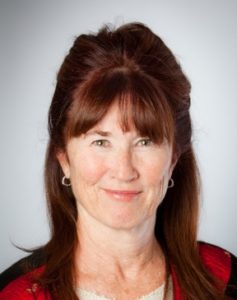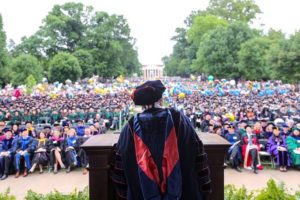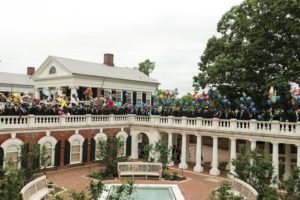Do We Ever Really Graduate?
The month of May brings the buzz of Final Exercises and fond farewells to Grounds. During May, Lifetime Learning will feature articles about graduation at the University of Virginia. Christine Kennedy, an expert in pediatric nursing and children’s behavioral health, offers commentary on lifelong learning with “Do We Ever Really Graduate?” Ms. Kennedy is an Associate Dean for Academic Programs, Madeline Higginbotham Sly Professor of Nursing, and Professor of Pediatrics in the School of Medicine.
Do We Ever Really Graduate?
In the next few weeks the Grounds, especially the Lawn, will be made ready for the annual Final Exercises that are so looked forward to by most 4th year students (and long suffering Graduate students) – not to mention said undergrad’s parental pocketbooks. It is somewhat less dramatic for the faculty as an ever recurring ritual. Although, as a newcomer to the faculty five years ago, I was stunned by the sheer size of it all during my first walk down the grass walkway from the Rotunda. But I experienced incredulity when, instead of feeling like my colleagues and I were running a gauntlet, we experienced the warm and delighted faces of parents actually clapping as we traipsed by a ‘small city of families’ to the final seating in front of Old Cabell Hall. Many alumni tell me they wax nostalgic to that fateful event and its pleasant memories.
But do we ever really graduate? Think about it. Beginnings are less celebrated (well except perhaps being born, and who remembers that event anyway?), but transitions that mark passage from one state of existence to another are somewhat more liminal. Most of my research has focused on the health of very young children — what habits they develop as part of their early experiences (in many different cultures around the world) with a specific focus on those that underpin health behaviors. And critical to the final outcome from childhood to adulthood is exactly what those habits portend for the future of one’s health status. Some habits are antecedents to predictable health problems later in life and some don’t amount to a hill of beans a few years later! One positive example most people can somewhat relate to is learning how to brush their teeth. There was a time when someone else did it for us, them spending some months reminding us to do it, but eventually most people continue to brush their teeth on their own once or twice a day for the rest of their lives. Boring, but true, and not really something someone would call out as a classic graduation phenomena, except perhaps by your dentist.
Other more important roots of who we are lie in the development over time of our critical close relationships – attachments to those who take care of us, who hopefully have loved us and to whom we have learned the basics of the human experience. Those have beginnings and endings, but did we graduate from them? Hard to think that we have transitioned out of a world where relationships are key to life, and then graduate to one where they are not, in adulthood.
So why is it that academic experiences are marked as having beginnings and endings so as to suggest that we begin, complete, and then stop learning? Surely some old Broadway show tunes have addressed this Gordian knot? I can just hear the con man “Professor” Harold Hill crooning the tune from the Music Man:
“Friend, either you’re closing your eyes
To a situation you do not wish to acknowledge
Or you are not aware of the caliber of disaster indicated
By the presence of a pool table in your community.
Well, ya got trouble, my friend, right here,
I say, trouble right here in River City.”
So if the classroom is the pool hall, and UVA is River City, then the Professor has neatly spelled it out for all of us. We shouldn’t close our eyes to a perception that education stops when you graduate, and one should never underestimate lifelong learning as the best way to have fun and never really graduate from it! So to that end, we’ll see you on the Lawn this year, and every year until death do us part.
- Guastavino Tile at the University of Virginia
- Abraham Lincoln on Character, Leadership and Education
- Silence is Golden: Celebrating the History of Silent Films
- UVA Club of Atlanta: Women's ACC Basketball Tournament - UVA Fan Events
- UVA Northern Virginia Programs Fair
- UVA Club of Los Angeles: Influential Communication


